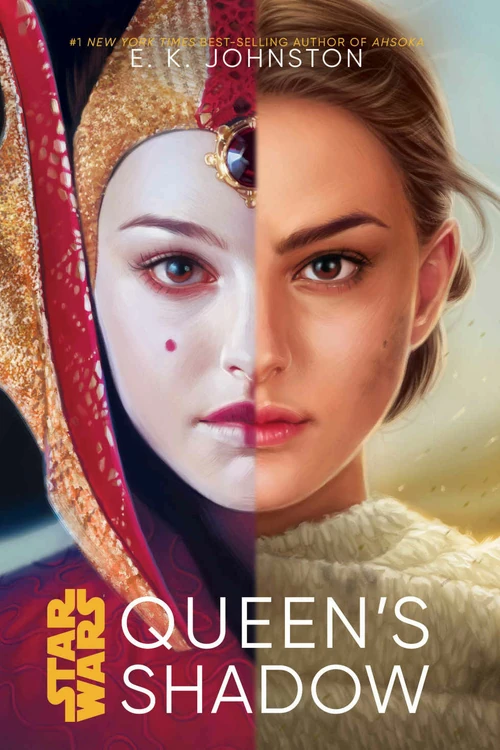
This canon intermediary between Star Wars Episodes I and II opens with elections on Naboo where Gungans are allowed to the polls for the first time in a while, with outgoing Queen Amidala neutral regarding her successor but nonetheless performing her civic duty. Meanwhile, fellow Naboo politician and current Chancellor Sheev Palpatine attempts to get ahold of her, with a subsequent conversation highlighting Padmé’s opposition to slavery on Tatooine, where she hopes to purchase Shmi Skywalker’s freedom in accordance with her son and Jedi apprentice Anakin’s wishes. Réillata wins the election, with Padmé offered to become the planet’s Senator in the Galactic Senate, to which she agrees.
The book is divided into five parts, with the beginning of each highlit by faux segments from the fictitious TriNebulon News that mostly emphasize Padmé’s appointment as Senator and performance in the office. She first befriends Senator Bail Organa of Alderaan, around which time a protocol droid serving as her guide malfunctions and makes an attempt on her life. Meanwhile, one of Padmé’s handmaidens, Sabé, serves as a double agent when visiting Tatooine, where the gradual process of purchasing slaves’ freedom occurs, although there’s no sign of Shmi Skywalker. Moreover, Trade Federation politician Nute Gunray, then on trial, retains his vendetta against the new Senator.
Among the early political discussions in which Padmé takes part is one about permacrete, with her early tenure as Senator rough, although subsequent months prove smoother for her. She visits the planet Alderaan to meet Senator Organa’s wife Queen Breha, and returns to Naboo where she meets her family, including her parents, sister, and infant niece. A debate arises regarding the aqueduct system on the planet Bromlarch, with the Senate initially voting down a resolution to provide assistance, the Trade Federation offering a treaty to which Padmé urges opposition. The book ends on two somewhat-negative notes, one of a flashforward to the end of Episode III.
Overall, this was an enjoyable read with good political overtones and a glance into the fictitious politics of Star Wars’ Galactic Republic, also giving insight into Padmé’s relatives and gives indication that she wasn’t apathetic towards Anakin’s wishes to free his mother from slavery. The faux news segments in between the book’s major subsections are a nice touch as well, and give the Galactic Republic a sense of authenticity. There are issues with the general lack of descriptions or reminders as to the appearances, in some cases species, of certain characters that don’t appear in the films, but I would definitely recommend this book to fans of the science-fiction franchise.
The book is divided into five parts, with the beginning of each highlit by faux segments from the fictitious TriNebulon News that mostly emphasize Padmé’s appointment as Senator and performance in the office. She first befriends Senator Bail Organa of Alderaan, around which time a protocol droid serving as her guide malfunctions and makes an attempt on her life. Meanwhile, one of Padmé’s handmaidens, Sabé, serves as a double agent when visiting Tatooine, where the gradual process of purchasing slaves’ freedom occurs, although there’s no sign of Shmi Skywalker. Moreover, Trade Federation politician Nute Gunray, then on trial, retains his vendetta against the new Senator.
Among the early political discussions in which Padmé takes part is one about permacrete, with her early tenure as Senator rough, although subsequent months prove smoother for her. She visits the planet Alderaan to meet Senator Organa’s wife Queen Breha, and returns to Naboo where she meets her family, including her parents, sister, and infant niece. A debate arises regarding the aqueduct system on the planet Bromlarch, with the Senate initially voting down a resolution to provide assistance, the Trade Federation offering a treaty to which Padmé urges opposition. The book ends on two somewhat-negative notes, one of a flashforward to the end of Episode III.
Overall, this was an enjoyable read with good political overtones and a glance into the fictitious politics of Star Wars’ Galactic Republic, also giving insight into Padmé’s relatives and gives indication that she wasn’t apathetic towards Anakin’s wishes to free his mother from slavery. The faux news segments in between the book’s major subsections are a nice touch as well, and give the Galactic Republic a sense of authenticity. There are issues with the general lack of descriptions or reminders as to the appearances, in some cases species, of certain characters that don’t appear in the films, but I would definitely recommend this book to fans of the science-fiction franchise.
No comments:
Post a Comment